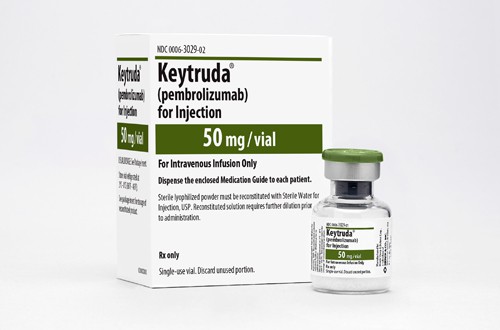
Merck & Co/MSD’s checkpoint inhibitor Keytruda cut the risk of disease progression or death by 35% in patients with locally advanced or metastatic oesophageal and gastroesophageal junction (GEJ) cancer.
The results from the KEYNOTE-590 trial, presented at the 2020 European Society for Medical Oncology (ESMO) virtual congress, showed that Keytruda in combination with chemotherapy significantly improved overall survival, reducing the risk of death by 27%.
The anti-PD-1 therapy was given alongside chemotherapy as a first-line treatment for patients with advanced oesophageal cancers, and is the first checkpoint inhibitor to show superior overall survival, progression-free survival and objective response rates for this patient population – regardless of PD-L1 expression status.
“These findings for Keytruda in combination with chemotherapy are particularly impressive considering improvement in overall survival was observed across all patient populations – including those patients with oesophageal squamous cell carcinoma, adenocarcinoma and gastroesophageal junction tumours – and regardless of PD-L1 expression,” said Roy Baynes, senior vice president and head of global clinical development, chief medical officer at Merck Research Laboratories.
“Our goal is to extend the lives of people living with cancer, and these important findings add to a growing body of survival data for Keytruda in a wide range of cancers,” he added.
Merck’s main rival in oesophageal cancer is Bristol Myers Squibb’s Opdivo (nivolumab), which was approved by the US Food and Drug Administration (FDA) in June for the treatment of second-line unresectable advanced, recurrent or metastatic oesophageal squamous cell carcinoma that has progressed after chemotherapy treatment.
Keytruda is already approved as a monotherapy for second-line treatment of unresectable advanced, recurrent or metastatic oesophageal squamous cell carcinoma, but only for patients whose tumours express PD-L1.
Opdivo is also chasing approval in the first-line setting, with BMS revealing promising data for the PD-1 inhibitor at this treatment stage at ESMO 2020.
In the CheckMate-577 trial involving patients with oesophageal or GEJ cancers who had previously received neoadjuvant chemoradiation therapy (CRT) and tumour resection, Opdivo doubled the median disease-free survival rate compared to placebo.
In addition, the median duration of treatment for patients in the Opdivo arm was 10.1 months, compared to nine months in the placebo – a modest improvement.
Merck plans to share the data from KEYNOTE-590 with global regulatory authorities over the coming months.




